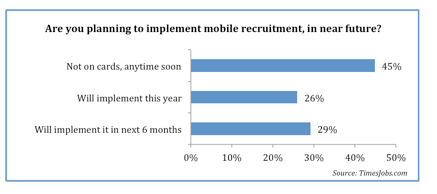
With almost the entire working population of India accessible on mobiles, 45% of Indian organizations still don’t have a comprehensive mobile recruitment strategy
20 Feb 2014: Over 50% of India’s Active Internet users are accessing internet on their mobile, apart from other sources states the latest IAMAI report. This is a clear indication that there has been a huge uptake in consumption of the Mobile Internet medium.
Prabhat Bhardwaj, Head-HR & Administration, Technopak Advisors, estimates that 85% of the online operations by jobseekers have shifted from personal computers to smartphones in the past 2 years, especially in metros and big cities.
Being one of India’s leading jobsites, TimesJobs started offering mobile recruitment solutions in early 2006 with a basic “Jobs on SMS” Service – with the advent of GPRS, the WAP site m.timesjobs.com/ was launched in 2008, this was quickly followed by Mobile apps for iPhone, android and Java phones. All these initiatives have met with tremendous adoption and success, as a mobile phone provides jobseekers the privacy they desire, while searching and applying for jobs anywhere and at any time.
The Corporate Challenge:
However adoption of this medium by India Inc. is falling behind the trend – 45 per cent of organizations polled are still apprehensive of implementing mobile device-based recruitment in the near future, revealed the latest TimesJobs.com study.
As per the latest TimesJobs study, even though most Indian organizations agree on the up-sides:
- • 58% employers feels it’s an easy and quick technique
- • 29% organizations will implement mobile recruitment in the next 6 months
- • 24% organizations plan to target prospective candidates through mobile with the help of internal staff

There are three main reasons for their lack of implementation:
- Staffing leaders not well versed with this technique (41% of organizations polled)
- A Mobile Recruitment Policy may lack reliability since there is no one app that can function across platforms (44%)
- Security is a big concern (26%)
Sanjay Kapoor, director & CEO, IRIS Corporate Solutions Private Limited maintains that lack of maturity and awareness on the part of both recruiter and candidate adds to the concern over mobile recruitment usage. “India has never been a leader as far as application of technology is concerned; we have always been a follower. Mobile is not yet established as a globally recognized recruitment tool. India will take another 5 years to actually employ it as a core recruitment tool.”
“With the escalating war for high performance talent, mobile recruitment’s ease of access, highest reach, high interactivity and shortest response time will ensure we will constantly develop new ways for India Inc. to reach out to the mobile user, with the hope of increased engagement and further visibility. As always, it will be the early adopters who’ll benefit the most from this shift to the mobile screen.” says Vivek Madhukar, COO, TBSL which owns India’s leading job portal Timesjobs.com
Interestingly, the early adopters, leading the charge in mobile recruitment processes have largely been the start-ups or small organizations (45%), of which 32% have deployed it for ease of use and cost savings. Large organizations, on the other hand, still have to understand the power of digital in the changing market dynamics, with only 20% agreeing to have tried hiring through mobile applications.
Over 45% organizations are using mobile recruitment to tap the entry/junior level and mid-level executives. For senior level positions, a telephonic discussion followed by a face-to-face interaction is still preferred.
While Gartner reports that smartphone sales have increased by 166.8%, making India – the world’s fastest growing smartphone market, in the last quarter of 2013. It seems India Inc is still teetering on the brink of large-scale adoption – being just a matter of time before most HR and staffing leaders in India embrace it wholeheartedly.
For more insights and analysis visit www.content.timesjobs.com
